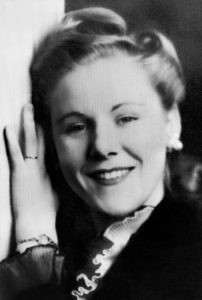
Viola Luizzo
*Viola Liuzzo Liuzzo was born on this date in 1925. She was a white-American Civil Rights activist.
Born Viola Fauver Gregg in California, she was the elder daughter of Eva Wilson, a teacher, and Heber Gregg, a coal miner and World War I veteran. The couple had one other daughter, Mary, in 1930. While on the job, Viola’s father was injured and, during the Great Depression, could not provide for his family as a coal miner: the Greggs became solely dependent on Eva’s income. Her mother worked hard, as she could only pick up sporadic, short-term teaching positions. The family descended into poverty and decided to move to pursue better job opportunities.
When Viola was six, the family moved to Chattanooga, Tennessee, where her childhood and adolescence were in poor, white Tennessee. It was here that she experienced firsthand the segregated nature of the South. This would eventually have a powerful impact on her activism and the injustice of segregation and racism. Though she and her family lived in conditions of great poverty, they were still afforded social privilege and amenities denied to Blacks under the Jim Crow laws.
In 1941, the Gregg family moved to Ypsilanti, Michigan, where her father sought a job assembling bombs at the Ford Motor Company. She dropped out of high school after one year and eloped at 16. The marriage did not last, and she returned to her family. Two years later, the Gregg family moved to Detroit, Michigan. The tension between whites and Blacks in Detroit was very high in the early 1940s with violence and rioting. Witnessing these horrific ordeals motivated her future civil rights work. In 1943, she married George Argyris. They had two children, Penny and Evangeline Mary, and they divorced in 1949. She later married Anthony Liuzzo, a Teamsters union business agent. They had three children: Tommy, Anthony, Jr., and Sally. Liuzzo attended the Carnegie Institute in Detroit, Michigan. She then enrolled part-time at Wayne State University in 1962.
In 1964, Liuzzo began attending the First Unitarian Universalist Church of Detroit and joined the National Association for the Advancement of Colored People (NAACP). Liuzzo believed in the fight for civil rights and helped organize Detroit protests. In addition to actively supporting the civil rights movement, Liuzzo was notable for her protest against Detroit laws that allowed students to drop out of school. Liuzzo's disagreement with this law, which stems from her firsthand knowledge of the consequences of such a decision, led her to withdraw her children from school in protest. Because she deliberately homeschooled them for two months, Liuzzo was arrested but did not waver. She pled guilty in court and was placed on probation.
Liuzzo was horrified by the images of the incident at the Edmund Pettus Bridge. Nine days later, she took part in a protest at Wayne State. She then called her husband to tell him she would be traveling to Selma after hearing the Rev Dr. Martin Luther King Jr. call for people of all faiths to come and help, saying that the struggle "was everybody's fight." Leaving her children in the care of family and friends, she contacted the Southern Christian Leadership Conference (SCLC), took her on, and tasked her with delivering aid to various locations, welcoming and recruiting volunteers, and transporting volunteers and marchers to and from airports, bus terminals, and train stations, for which she volunteered the use of her car, a 1963 Oldsmobile. She participated in the later largely peaceful march from Selma to Montgomery between March 21 and 25.
On March 25, 1965, after the third march concluded, Liuzzo and Leroy Moton, a 19-year-old African American, continued shuttling marchers and volunteers. While driving along Route 80, a car tried to force them off the road. Later, on a back road, returning to Selma, a car with four Ku Klux Klan members pursued them. Overtaking the Oldsmobile, three men shot directly at her, hitting her twice in the head and killing her instantly. Her car veered into a ditch and crashed into a fence.
Liuzzo's funeral was held at Immaculate Heart of Mary Catholic Church in Detroit, with many prominent members of both the civil rights movement and government there to pay their respects. Included in this group were Dr. Martin Luther King, Jr.; NAACP executive director Roy Wilkins; Congress on Racial Equality national leader James Farmer; Michigan lieutenant governor William G. Milliken; Teamsters president Jimmy Hoffa; and United Auto Workers president Walter Reuther. She is buried at Holy Sepulchre Cemetery in Southfield, Michigan. Less than two weeks after her death, a charred cross was found in front of four Detroit homes, including the Liuzzo residence.
To Become a Social Worker